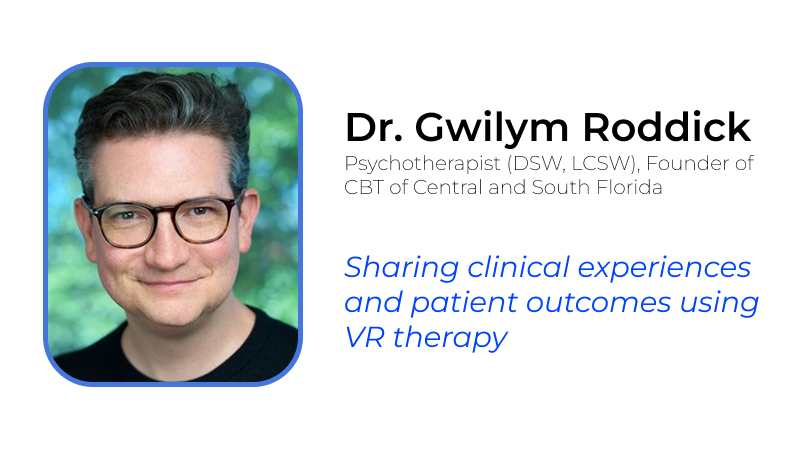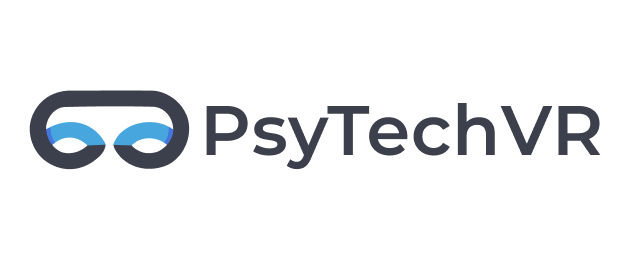Blog - Therapy
Understanding VR for Cognitive Behavioral Therapy (CBT): Techniques and Benefits
By Dr. Gwilym Roddick, Advisory board member at PsyTechVR
February 18, 2025
Mental healthcare is currently at a very important point in its development, combining traditional therapeutic approaches with cutting-edge technology. Virtual Reality in Cognitive Behavioral Therapy is one of the most noteworthy examples of such innovations, completely reshaping the way mental health treatment can be approached. There are plenty of new possibilities that are opened up using a combination of immersive digital environments and time-tested psychological principles.
How Does Virtual Reality-Enhanced CBT Work?
Abstract concepts can become tangible experiences when it comes to the combination of virtual reality and cognitive behavioral therapy. CBT supported by VR can transport patients into dedicated digital spaces that are custom-fit to address their specific issues, making it a stark contrast to traditional CBT sessions that are usually confined to office-like environments.
Dr. Roddick's Insights
Host Jessica Reyes with the Mental Health TV Network and guest therapist Dr. Gwilym Roddick discuss the potential of virtual reality therapy (VR). Dr. Roddick explains how this cutting-edge approach works by helping you overcome your fears, build resilience, and change the patterns of avoidance.
The Primary Goals of VR-Enhanced CBT
VR-enhanced CBT is, at its core, just another way to amplify the effectiveness of traditional cognitive behavioral therapy using interactive learning and immersive exposure. The key objectives of VR-enhanced CBT are:
- To use behavioral activation more often due to the ability of virtual reality to create situations that are either impractical or straight-up impossible to create in traditional settings. Height exposure, flying on an airplane, and public speaking scenarios are just a few examples of how the virtual reality environment can create controlled yet realistic environments for therapeutic purposes.
- To build up the emotional resilience of the patient using repeated exposure procedures and practice. This is where a lot of professionals in the field attempt to find the so-called “window of tolerance”, which is a delicate spot between productive challenge and overwhelming stress in each patient’s mind.
3. To create a safe space for confronting fears and challenges, making it easier to practice new skills or face the fears without any of the risks or consequences in the real world. The virtual environment can operate as a bridge between theory and practice, offering immediate feedback to the therapist while allowing patients to progress at their own pace.
AI-powered Safe place / inside PsyTechVR software
Experience the system allowing to create any personalized and tailored Calm Space within 30 seconds
What are the Biggest Differences Between VR-assisted CBT Different from Other Treatments?
The most notable distinction lies in the impressive level of control and engagement that this technology provides. Most of the traditional talk-oriented therapy relies on verbal processing and imagination as its most significant driving forces, and any medication-based approach would only work at a biochemical level. In this case, VR-enhanced CBT is the middle ground that allows for tangible experiences and cognitive processes to be used in tandem.
The technology in question allows for a much more granular control over the exposure levels – something that no real-world scenario could ever provide. The intensity of virtual experiences can be adjusted by a therapist in real-time based on client feedback and progress, making the therapy much more adaptable to different comfort levels and individual needs of each patient.
What Mental Health Conditions Does This Technology Work With?
The total spectrum of mental health challenges that this approach can help with is surprisingly wide. Anxiety disorders, for example, have a long positive history when it comes to responding to VR-enhanced CBT due to the aforementioned ability to provide granular exposure to anxiety-provoking situations in controlled environments.
Post-traumatic stress disorders can also benefit greatly from the VR-assisted mental health by providing a safe space that patients can recreate and process their traumatic scenarios in a virtual nature of the environment acts as a buffer between the patient and their triggers, making it possible to conduct therapeutic processing without the risk of retraumatization.
Social anxiety and other specific phobias can also be treated using virtual scenarios that are easily repeatable or modifiable when necessary. The consistency with which the virtual environments are presented helps ensure that any exposure therapy would progress in a steady and systematic manner.
Post-traumatic stress disorders can also benefit greatly from the VR-assisted mental health by providing a safe space that patients can recreate and process their traumatic scenarios in a virtual nature of the environment acts as a buffer between the patient and their triggers, making it possible to conduct therapeutic processing without the risk of retraumatization.
Social anxiety and other specific phobias can also be treated using virtual scenarios that are easily repeatable or modifiable when necessary. The consistency with which the virtual environments are presented helps ensure that any exposure therapy would progress in a steady and systematic manner.
Who Would Benefit the Most from the Introduction of VR-Enhanced CBT?

Even though VR technology shows promise across many different demographics, there are still a few specific groups and categories that might find it much more beneficial than the rest.
Digital natives are the first example of such a group – people that already grew up around such technology, making their engagement with VR-enhanced therapy a lot easier than with traditional approaches. Alternatively, patientsthat struggle with the talk therapy in general might find VR-assisted CBT more engaging and accessible in comparison.
This tool reaches its peak usefulness when applied to patients that need it but have some limitations when it comes to accessing real-world scenarios – be it a fear of flying, public speaking anxiety, etc. VR can be a practical alternative to many different approaches that would be completely impractical or even impossible to recreate in the real-world.
Proper understanding of how fundamental concepts of traditional therapy, supported by VR tools, can translate into practical therapeutic tools and examples. Our next step here would be to explore different techniques and methods that this technology uses, presenting different ways of how VR transforms traditional CBT techniques in a much less theoretical manner.
Digital natives are the first example of such a group – people that already grew up around such technology, making their engagement with VR-enhanced therapy a lot easier than with traditional approaches. Alternatively, patientsthat struggle with the talk therapy in general might find VR-assisted CBT more engaging and accessible in comparison.
This tool reaches its peak usefulness when applied to patients that need it but have some limitations when it comes to accessing real-world scenarios – be it a fear of flying, public speaking anxiety, etc. VR can be a practical alternative to many different approaches that would be completely impractical or even impossible to recreate in the real-world.
Proper understanding of how fundamental concepts of traditional therapy, supported by VR tools, can translate into practical therapeutic tools and examples. Our next step here would be to explore different techniques and methods that this technology uses, presenting different ways of how VR transforms traditional CBT techniques in a much less theoretical manner.
Key Techniques of VR-Enhanced CBT Therapy
The practical applications of VR in CBT managed to help introduce a substantial range of new innovative techniques that are far more effective than any traditional approach to the same issue. These techniques and methods can utilize the potential of VR to an unprecedented degree, creating a therapeutic experience that is far more effective and engaging than ever before.
All these improvements represent the cutting edge in modern psychological intervention, be it sophisticated exposure protocols, interactive mindfulness exercises, etc.
All these improvements represent the cutting edge in modern psychological intervention, be it sophisticated exposure protocols, interactive mindfulness exercises, etc.
How Do VR Exposure Therapy Tools Help Therapists Work with CBT?
Techniques like systematic desensitization gain a completely new level of effectiveness with the addition of virtual reality environments. Therapists can now create extremely precise exposure sequences in VR instead of relying just on the imagination of the patient or the limitations of real-world scenarios. For example, if a patient has a fear of heights, they can start working on it by looking out of a second-floor window in virtual reality and gradually increasing the height of the building in question while also practicing various anxiety management techniques.
It is also possible to use biofeedback integration during such scenarios, detecting physiological responses of the patient like skin conductance, heart rate, etc. The ability to collect objective information like this helps both patient and therapist to gain a better understanding of different stress responses, resulting in better-tailored intervention strategies.
It is also possible to use biofeedback integration during such scenarios, detecting physiological responses of the patient like skin conductance, heart rate, etc. The ability to collect objective information like this helps both patient and therapist to gain a better understanding of different stress responses, resulting in better-tailored intervention strategies.

What Skills Do You Learn in VR-Enhanced CBT?
The virtual environment can also serve as a great place to develop important life skills, such as social interaction training. It benefits greatly from programmable virtual characters that can respond differently to different approaches. This way, patients would be able to practice complex social scenarios without any real-world consequences.
Emotional regulation techniques can also be taught with interactive exercises that allow clients to visualize and interact with their own emotions in a virtual environment. For example, anxiety can be presented as a storm cloud of sorts, and patients would learn to “disperse” them using cognitive restructuring, breathing exercises, etc.


Problem-solving skills can also be developed in virtual scenarios, presenting increasingly complex challenges that allow clients to practice their decision-making skills in safe environments with the ability to receive immediate feedback on their actions.
Journaling and Thought Records
VR-enhanced CBT also has the potential to revolutionize traditional therapy homework through recording thoughts, and turning it into immersive documentation instead. Simple paper journals can be replaced using virtual thought maps, which are three-dimensional representations of their thought patterns with examples that can help each patient examine and describe their logic in a more efficient manner.
Such technology also gave birth to the development of real-time cognitive restructuring – an environment where negative thoughts can be immediately captured, examined, and modified in the same location. The immediate interaction with thought patterns can help people with strengthening the connection between identification and modification of problematic thinking patterns.
Such technology also gave birth to the development of real-time cognitive restructuring – an environment where negative thoughts can be immediately captured, examined, and modified in the same location. The immediate interaction with thought patterns can help people with strengthening the connection between identification and modification of problematic thinking patterns.
The Role of VR-Enhanced CBT in Mindfulness Practices
Virtual reality tends to bring new depth into existing mindfulness practices with the help of better environmental immersion. Specifically designed VR spaces can be used to practice presence and awareness with little-to-no real world interactions or distractions, which improves therapeutic benefits of the process.
Guided meditation sessions follow a similar pattern – they necessitate serene and calm environments in order to work, and virtual environments that can be tweaked to each client’s level of relaxation are the picture-perfect option. Subtle changes to the environment in question as patients achieve deeper states of mindfulness are also a nice touch, offering visual feedback for progress.
The connection between physical sensations and thoughts can also be explored further with the introduction of VR into body scan exercises. Virtual representation of a person’s body can be used to highlight different areas of discomfort or tension, creating a more tangible illustration of the concept of mind-body connection.

Each of these methods tends to build upon the others, creating a complex therapeutic approach that has a lot of freedom for customization and fine-tuning, especially with virtual reality’s capabilities in mind. The next section is going to use this knowledge as the foundation to explain what specific tools and methods can help combat certain mental health challenges with a clear practical impact of the VR onto this sphere.
How VR-Enhanced CBT Can Help with Anxiety and Depression
Traditional CBT has been proven effective to treat many types of mood disorders many decades ago, but the addition of virtual reality to this mix opens up a lot of opportunities that were previously impossible in this field. The ability to create controllable, immersive environments makes it possible to address the complexities of anxious and depressive symptoms in a new light.
What Strategies Does VR-Enhanced CBT Use to Combat Negative Thoughts?

Aside from traditional cognitive restructuring, virtual environments can also be used to perform experimental reframing – a strategy that challenges negative thought patterns directly instead of just relying on discussions. If patients can encounter their cognitive distortions in the form of physical obstacles they can overcome in virtual reality – they can see these distortions as manageable and tangible, thus making them potentially easier to deal with.
These new therapy methods can also use behavioral activation loops, connecting virtual accomplishments with immediate positive feedback. Completing one such task in virtual reality might trigger some sort of environmental change, reinforcing the connection in a depressed person’s mind between actions and mood improvements as cause and effect. Such immediate reinforcement also helps bridge the gap in motivation that traditional therapy often has to deal with.
These new therapy methods can also use behavioral activation loops, connecting virtual accomplishments with immediate positive feedback. Completing one such task in virtual reality might trigger some sort of environmental change, reinforcing the connection in a depressed person’s mind between actions and mood improvements as cause and effect. Such immediate reinforcement also helps bridge the gap in motivation that traditional therapy often has to deal with.
How Effective Is VR Therapy for Treating Depression and Anxiety?
The positive effects of VR-improved CBT can be noticed with ease due to the technology’s ability to track symptom progression and engagement metrics of a patient in real-time. Virtual environments are capable of monitoring all kinds of minor changes in a patient’s interaction with their surroundings, including even something as minor as gaze direction or movement pattern, all of which can be used by a therapist as objective data showcasing the effectiveness of current therapy methods.
There is also the fact that therapeutic momentum can be calculated completely differently in virtual environments. For example, many traditional therapy methods often require several weeks to see any behavioral changes. VR environments are far more effective in that regard, offering practically immediate changes with the correct set of configurations applied beforehand.
There is also the fact that therapeutic momentum can be calculated completely differently in virtual environments. For example, many traditional therapy methods often require several weeks to see any behavioral changes. VR environments are far more effective in that regard, offering practically immediate changes with the correct set of configurations applied beforehand.
Can VR-Based CBT Help Change Unhelpful Thought Patterns?
One of the most useful methods to combat unhelpful thought patterns that was introduced with the implementation of VR are pattern interruption techniques. They are mostly self-explanatory – therapeutic methods that try to interrupt negative thought patterns on both sensory and cognitive levels. For example, if a negative thought spiral emerges, the virtual environment can shift and engage different senses in order to break the cycle before it gets any worse – like calming stimuli, positive memory cues, and so on.
This is how the metacognitive visualization method works – helping patients step outside of their thought patterns in order to observe them from a different perspective. A third-person view like that can often help the person in question to find useful insights into their own thinking patterns that might not have been accessible with traditional therapy methods.
Generally speaking, virtual environments give a proverbial “new life” to various behavioral experiments in this field. One of the most interesting examples is when clients test their guesswork when it comes to anxiety-provoking situations or depressive thought patterns using virtual environments that feel “real enough” to generate an authentic emotional response while remaining in the safe physical environment, opening up opportunities for further treatment.
Our exploration of VR’s broader role in transforming CBT leads us to the next section that is going to examine different ways in which VR reshapes the foundations of many therapeutic practices, creating new standards for mental healthcare in the process.
Virtual Reality IN Cognitive Behavioral Therapy
The Role of Virtual Reality in CBT
Virtual reality’s integration into existing cognitive behavioral therapy practices is more than just a technological advancement – it is a complete paradigm shift in the way therapeutic intervention is approached now. It creates entirely new possibilities for growth and healing instead of just digitizing existing practices.
How VR Therapy Is Transforming CBT for Anxiety and Phobias
The impact of VR on exposure therapy turned it into something called a progressive immersion protocol – a complex and multifaceted approach that is above and beyond any of the traditional exposure methods. Granular scalability of virtual environments makes it easy for therapists to adjust the intensity of the exposure while also being able to change subtle environmental factors that might soothe or trigger anxiety responses.
DEMO: Showcasing application of VR (CBT protocol)
Questionnaires, VR exposure therapy, Safe Place excercise and Gathering session' statistics
The very nature of virtual environments also makes it easy to perform contextual learning enhancement – a situation where therapeutic lessons learned in one scenario can be immediately tested in different virtual contexts. It allows for much faster skill transfer capabilities, helping clients with developing better and more effective coping mechanisms that are easier to apply in real-world environments.
What Mental Health Issues Can VR-Based CBT Treat?
Aside from regular anxiety and depression, virtual reality opens up a lot more options when it comes to treating other complex conditions, such as dissociative disorders. The ability to create controlled splits between virtual and physical environments presents a variety of unconventional opportunities that help explore and integrate different aspects of consciousness.
Trauma processing is another field that can benefit greatly from the addition of virtual reality, resulting in a process called narrative reconstruction. It helps patients externalize their experiences, making it possible to view them from different perspectives while still maintaining emotional distance in the process (in order to avoid potential retraumatization).
Impulse control is also a good example of the advantages of virtual reality, helping clients practice restraint in a consequence-free environment with all kinds of triggering situations while monitoring the physiological responses of the person in question, assisting with the development of stronger self-regulation skills.
Trauma processing is another field that can benefit greatly from the addition of virtual reality, resulting in a process called narrative reconstruction. It helps patients externalize their experiences, making it possible to view them from different perspectives while still maintaining emotional distance in the process (in order to avoid potential retraumatization).
Impulse control is also a good example of the advantages of virtual reality, helping clients practice restraint in a consequence-free environment with all kinds of triggering situations while monitoring the physiological responses of the person in question, assisting with the development of stronger self-regulation skills.
Is VR Therapy as Effective as Traditional CBT?
It is not particularly practical to compare the two methods due to the fact that they are both still used in therapy and each have their own advantages and disadvantages. Traditional CBT better establishes therapeutic alliance with prolonged personal interactions, while VR-improved CBT creates immersive therapeutic engagement in virtual reality, which can be beneficial in its own right.
As such, the most notable comparison in this situation can only be the treatment acceleration – the fact that virtual environments can compress multiple weeks of work into just a few sessions, even if it does require additional monitoring of the patient’s readiness and resilience. Rapid skill acquisition is the term that has been going around for several years now, representing immediate application and feedback during each session.
The adaptability of virtual reality environments also makes for a reasonably high level of therapeutic customization – the ability to shift the entire environment in response to the client’s progress, with dynamic treatment landscapes being used for each patient in an individual manner with the ability to customize different aspects of those environments as the therapy progresses.
As such, the most notable comparison in this situation can only be the treatment acceleration – the fact that virtual environments can compress multiple weeks of work into just a few sessions, even if it does require additional monitoring of the patient’s readiness and resilience. Rapid skill acquisition is the term that has been going around for several years now, representing immediate application and feedback during each session.
The adaptability of virtual reality environments also makes for a reasonably high level of therapeutic customization – the ability to shift the entire environment in response to the client’s progress, with dynamic treatment landscapes being used for each patient in an individual manner with the ability to customize different aspects of those environments as the therapy progresses.
VR and Cognitive Behavioral Therapy
PsyTechVR for CBT Therapy
Modern VR applications for cognitive behavioral therapy, such as PsyTechVR, can provide complex feature sets in order to greatly improve the overall therapeutic experience. The following capabilities can be expected from such software:
- Progressive scenario development capabilities with gradual progression of any support by providing more complex and nuanced environments when necessary
- Interactive elements that help practice coping strategies and safety procedures in safe and secure virtual environments
- Real-time psychological tracking with multiple biological markers being tracked at all times (heart rate, skin conductance, etc.)
PsyTechVR’s software supports the most popular VR headsets: Meta Quest 3, Quest 3s, Quest 2, and even Pico 4 or HTC Vive, making it a much less expensive option compared with most examples of previous-generation VR hardware.
Please note that PsyTechVR is a support tool intended for use by trained mental health professionals or under their supervision; it is not a standalone medical treatment. Users should be screened for suitability (e.g., motion sensitivity, neurological conditions) before using CBT enhanced by VR.
* PsyTechVR is fully GDPR-compliant: no personal data or biometric information is collected, stored, or used at any point.

Frequently Asked Questions
Learn more about CBT and VR
- Traditional CBT does offer a certain degree of self-help possibilities, but the complexity of VR-enhanced CBT requires professional guidance due to all the virtual exposure protocols and the necessity for clinical supervision during each session. With that being said, many clients also achieve success in practicing certain maintenance exercises between sessions with simplified VR applications. However, establishing a good foundation beforehand is important here before attempting any self-directed work.
- Similar to one of the previous topics in the article, medication and VR-enhanced CBT work best when used as complementary intervention methods instead of competing approaches. Medication can offer quicker symptom relief due to its biochemical nature, while CBT in virtual reality creates much more significant behavioral and cognitive changes using experiential learning. An optimal result for most clients is a carefully planned combination of different approaches, with medication acting as initial stable ground, and VR-CBT helping with creating sustainable coping strategies in the long run.
- You can scroll down the page to learn more, and sign up for our online presentation call so PsyTechVR team expert can showcase the DEMO from his device. You don't need a credit card to access the FREE TRIAL. We are proud of our system and ready to assist you in trying it out.
- During the free trial, you have the option to schedule four calls with our onboarding team (once per week). Our skilled trainers will assist you in learning the VR platform and how to use virtual reality therapy. We would be happy to help, as we have already assisted thousands of therapists in exploring this technology.
- The training can be done individually or as a group session with your colleagues. Once the training is complete, you will receive a "VR Implementation Guide" that contains frequently asked questions and video recordings on each part of the system.


Complete VR Bundle Package for $1599 *
Buying options
PsyTechVR Bundle
Your VR headset
Book a DEMO to get a 15-day FREE TRIAL, then use your own VR device or order a Meta Quest separately
15-day Free Trial, then $120/month
Includes the latest Meta Quest 3s, 12-month access, regular updates, support, training, and marketing materials
* Limited time offer until product is in stock
VR Bundle
Special offer: 35% off Storewide
$
1,599
$
2,499
- Latest Meta Quest 3s (128GB) VR Headset with the installed VR app
- 12-Month Access to PsyTechVR Platforms
- Generative-AI to create exposure scenarios
- Dedicated Support Manager
- Comprehensive 4-Hour Training & Certificate
- Exclusive Marketing Materials for your website and social media
*VR headset will belong to you with full access to the VR app store
PsyTechVR: made by professionals,
for professionals
These psychotherapists and psychologists define the development of our product and methodology since 2020
- Dr. Albert "Skip" Rizzo
Leading expert in VR Therapy with 30+ years' experience.
VR scientist (ResearchGate)
Clinical psychologist. With 30+ years in VR research, Dr. Rizzo has developed groundbreaking VR tools for treating PTSD, TBI, autism - Dr. Udi OrenClinical psychologist and senior medical psychologist, PhDPast President at EMDR-EUROPE, Chief instructor of the EMDR method in Israel (Senior Trainer), President of Israel EMDR Association
- Dr. Gwilym RoddickPsychotherapist (DSW, LCSW), Founder of CBT of Central and South FloridaCBT/ERP/ACT expert, OCD Central and South Florida Board Member, ABCT committee member, Florida and New York based
- Dr. Lynn PanattoniClinical psychologist specializing in integrative and functional medicine, PhDLicensed clinical psychologist specializing in trauma, anxiety, and integrative mental health. Expert in CBT, mindfulness & lifestyle medicine
- Dr. Elizabeth McMahon
Clinical Psychologist since 1980, author of Virtual Reality Therapy for Anxiety" book
In memory of Dr. Elizabeth McMahon (1950-2024), whose vision and contributions continue to guide our mission - Dr. Gianni SerraClinical Psychologist and Psychotherapist, Certified Neuroscience specialistEvangelist of VR exposure therapy in Italy and member of the Italian Society of Cognitive Behavioral Psychotherapy
- Dr. Richard LambProfessor of Educational Psychology, Neurocognition Science Lab, University of GeorgiaPhD in science education and educational measurement. Dr. Lamb leverages neuroscience and VR to enhance STEM education
PsyTechVR:
by professionals,
for professionals
by professionals,
for professionals
These psychotherapists & psychologists define the roadmap and r&d of our company since 2020
Clinical Psychologist, Psychotherapist (CBT), Certified Neuroscience specialist
Dr. Gianni Serra
Evangelist of VR exposure therapy in Italy and member of the Italian Society of Cognitive Behavioral Psychotherapy
Dr. Albert "Skip" Rizzo
Clinical psychologist. With 30+ years in VR research, Dr. Rizzo has developed groundbreaking VR tools for treating PTSD, TBI, autism
Dr. Elizabeth McMahon
In memory of Dr. Elizabeth McMahon (1950-2024), whose vision and contributions continue to guide our mission
Clinical psychologist specializing in integrative and functional medicine, PhD
Dr. Lynn Panattoni
Licensed clinical psychologist specializing in PTSD, anxiety, and integrative mental health. Expert in CBT, mindfulness & lifestyle medicine
Psychotherapist (DSW, LCSW), Founder of CBT of Central and South Florida
Dr. Gwilym Roddick
CBT/ERP/ACT expert, OCD Central and South Florida Board Member, ABCT committee member, Florida and New York based
Clinical psychologist and senior medical psychologist, PhD
Dr. Udi Oren
Past President at EMDR-EUROPE, Chief instructor of the EMDR method in Israel, Chairman of Israel EMDR Association
Thanks for reading!
Dr. Gwilym Roddick
Advisory Board member at PsyTechVR
He is also the founder and director of the Cognitive Behavioral Therapy of Central & South Florida, PLLC – a multi-specialty group therapy practice that specializes in these same fields of CBT and adjacent methodologies.
Dr. Roddick earned his Master's degree in Columbia University and his Doctorate – in Rutgers University. His clinical training includes significant roles within Montefiore Hospital’s health system and a four-year tenure at The Ross Center's New York office, a highly respected evidence-based mental health practice.
Dr. Roddick has been a strong advocate for mental health standards, training, and practice from the beginning of his career. He is an active member of the Association for Behavioral and Cognitive Therapies, the New York City Cognitive Behavioral Therapy Association, and the International OCD Foundation. He has served on the Public Education and Media Dissemination Committee for several years within ABCT. He also holds a position on the Board of Directors of OCD Central and South Florida, along with the position in the Advisory Board of PsyTechVR.
Dr. Roddick has also maintained a decade-long practice in New York City in addition to his practice in Florida. He has been a therapist in a non-profit Headstrong Project for the past seven years, offering individual and group psychotherapy to Post-9/11 veterans.
Dr. Roddick specializes in treating anxiety disorders, obsessive-compulsive disorder (OCD), and substance use disorders. He employs evidence-based psychotherapies, including CBT, Acceptance and Commitment Therapy (ACT), and Exposure and Response Prevention (ERP), to help individuals overcome their challenges. His approach is straightforward and compassionate, focusing on carefully listening to clients and offering support tailored to their needs.
As an advisor for CBT development of PsyTechVR, Dr. Roddick provides ideational and methodological guidance to enhance the integration of CBT into virtual reality (VR) applications. His contributions aim to advance the effectiveness of VR-based therapeutic interventions, particularly in the context of exposure therapy, CBT and related therapies.
Dr. Roddick earned his Master's degree in Columbia University and his Doctorate – in Rutgers University. His clinical training includes significant roles within Montefiore Hospital’s health system and a four-year tenure at The Ross Center's New York office, a highly respected evidence-based mental health practice.
Dr. Roddick has been a strong advocate for mental health standards, training, and practice from the beginning of his career. He is an active member of the Association for Behavioral and Cognitive Therapies, the New York City Cognitive Behavioral Therapy Association, and the International OCD Foundation. He has served on the Public Education and Media Dissemination Committee for several years within ABCT. He also holds a position on the Board of Directors of OCD Central and South Florida, along with the position in the Advisory Board of PsyTechVR.
Dr. Roddick has also maintained a decade-long practice in New York City in addition to his practice in Florida. He has been a therapist in a non-profit Headstrong Project for the past seven years, offering individual and group psychotherapy to Post-9/11 veterans.
Dr. Roddick specializes in treating anxiety disorders, obsessive-compulsive disorder (OCD), and substance use disorders. He employs evidence-based psychotherapies, including CBT, Acceptance and Commitment Therapy (ACT), and Exposure and Response Prevention (ERP), to help individuals overcome their challenges. His approach is straightforward and compassionate, focusing on carefully listening to clients and offering support tailored to their needs.
As an advisor for CBT development of PsyTechVR, Dr. Roddick provides ideational and methodological guidance to enhance the integration of CBT into virtual reality (VR) applications. His contributions aim to advance the effectiveness of VR-based therapeutic interventions, particularly in the context of exposure therapy, CBT and related therapies.
Dr. Gwylim Roddick is a renowned clinical social worker and psychotherapist with substantial experience in CBT and related evidence-based treatment approaches.

Read more about PsyTechVR
We publish articles on phobias, mental health, upcoming events, and special offers
| | Get in touch We're ready to lead you into the future of mental health Sending this information you agree to share your personal information according and limited by our confidentiality statement. |

Welcome!
We're excited to offer you the chance to experience the power of PsyTech VR with a FREE Trial!




 PsyTechVR
PsyTechVR






